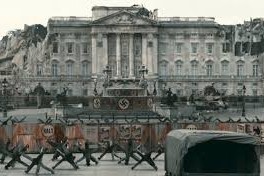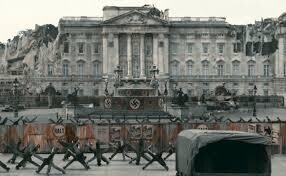
posted 1st November 2025

What if …?
This is one of the most fascinating questions of all. What might have happened is often more interesting than what did happen. It allows us to change the past, and thus to change both the present and the future.
When we imagine a different outcome to a past event, we create a counter-factual. Historians do not approve of counter-factuals. Their job is to find out what happened in the past, not what might have happened. They deal only in provable facts. Novelists and film makers, on the other hand, love counter-factuals; they give them the opportunity to reshape the past in exciting and imaginative ways. To take just one example, there are (at least) three different novels based on the counter-factual ‘What if Nazi Germany had successfully invaded and occupied Britain in 1940?’: SS-GB by Len Deighton, Fatherland by Robert Harris and Dominion by C.J. Sansom. All of them are good reads, and the first two have been made into films.
Debating, though, is about the future. It’s about proposing (or opposing) a course of action which will change the status quo. How, then, can debaters use counter-factuals?
The answer is that they can use different possible outcomes in the past to argue for or against different possible outcomes in the future. They can do this by using two different types of counter-factual:
1. Something that did happen but might not have.
2. Something that didn’t happen but might have.
Here’s an example of counter-factuals can be used on both sides of one particular motion: This house would reintroduce grammar schools.
Grammar schools were state-run schools which did not charge fees, but which selected students on the basis of an exam taken in Year Six. They typically educated the top 20%; the other 80% were sent to ‘secondary moderns’, where they received a less academic education. Grammar schools were set up soon after the Second World War, but were mostly turned into non-selective, comprehensive schools in the late 1960s and early 1970s. A very few areas still have them - currently, only 1% of schools in England are grammar schools.
The speaker for the proposition uses counter-factual type one:
Something that did happen but might not have.
‘Imagine if grammar schools had never existed. Think of all the clever boys and girls from poor backgrounds in the postwar generation who were given opportunities their parents could only have dreamt of, such as [insert names of successful former grammar school students - there are lots] who went on to high-flying careers and added so much to our society. If grammar schools had not existed, their talents would have been wasted. Think how much talent we could unlock if we reintroduced grammar schools …’
This speaker is using a counter-factual to show how something which worked in the past could be used again in the future.
The speaker for the opposition uses counter-factual type two:
Something that didn’t happen but might have.
‘Imagine if, instead of setting up the cruel system of grammar schools and secondary moderns, which condemned 80% of children to failure at the age of 11, separating them from their friends and dividing communities, the postwar government had set up a properly funded, well run comprehensive system, which provided gifted and talented children with an academic education in top sets. All of the benefits of social mobility which you claim grammar schools brought could still have been achieved, but without the stigma and social division that the 11+ system caused. What we need now is not a reversion to a selective system which failed 80% of children, but better support for the existing non-selective system, to enable it to support all children.’
This speaker is using a counter-factual to show how things could have been done better in the past, and is taking this example as a guide to how they should be done in the future.
The past may be past, but it can still be used as a guide to the future.





